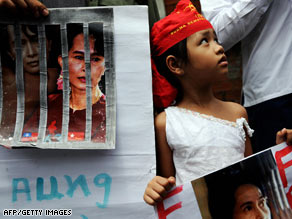
The United Nations Security Council on Thursday expressed "serious concern" over the conviction of Myanmar pro-democracy leader Aung San Suu Kyi while the European Union adopted additional sanctions against the nation.
“The members of the Security Council express serious concern at the conviction and sentencing of Daw Aung San Suu Kyi, and its political impact,” John Sawers of Britain, Security Council president for the month of August, told reporters. Members of the council noted that the Myanmar government reduced Suu Kyi’s sentence, and called on the government to do more “to create the necessary conditions for a genuine dialogue with Daw Aung San Suu Kyi and all concerned parties and ethnic groups in order to achieve an inclusive national reconciliation,” he said. The statement calls for all political prisoners to be released immediately, Sawers said. “Aung San Suu Kyi’s conviction is a violation of the universal principles of human rights,” said U.S. Ambassador Susan Rice. “Rather than using this moment to create the necessary conditions for a genuine dialogue and inclusive political process with all actors, the Burmese authorities have now moved further away from national reconciliation and deepened their isolation from the rest of the world,” Rice said. Also Thursday, the European Union adopted “a new set of targeted measures” against Myanmar, “in reaction to the verdict against Daw Aung San Suu Kyi and given the gravity of the violation of her fundamental rights,” according to a statement.
Don’t Miss
Sen. Webb to meet with Myanmar leaders
Myanmar: Suu Kyi to appeal her sentence
The measures include adding members of the Myanmar judiciary responsible for Suu Kyi’s conviction to a list of people and entities subject to a travel ban and assets freeze. The list of potential assets that can be frozen was also extended to include “enterprises owned and controlled by members of the regime in Burma/Myanmar or by persons or entities associated with them,” according to the EU statement. On Tuesday, Suu Kyi was sentenced to 18 months of house arrest stemming from a May incident in which an uninvited American man swam two miles to her home. The man, John William Yettaw, was sentenced to seven years of hard labor. Lawyers for both said they would appeal. A Myanmar court initially sentenced Suu Kyi, 64, to three years in prison for violating her house arrest. But Senior Gen. Than Shwe of the nation’s ruling junta commuted it to the 1½ years of house arrest. Yettaw, a 53-year-old former military serviceman from Falcon, Missouri, stayed in Suu Kyi’s home for two days. He testified in court that God had sent him to Myanmar to protect the opposition leader because he dreamed that a terrorist group would assassinate her. He was convicted of violating immigration laws, municipal laws and Suu Kyi’s house arrest terms. Suu Kyi has spent 14 of the past 20 years in one form of confinement or another — most recently under house arrest in a crumbling lakeside home. The country’s regime rarely allows her visitors, and foreigners are not allowed overnight stays in local households without government permission.
Suu Kyi, who won the Nobel Peace Prize in 1991, has said she doesn’t know Yettaw, did not know of his plans and denied wrongdoing. She told the court she did not report the intrusion because she did not want Yettaw or anyone else to get in trouble. Her prosecution has been criticized by world figures including U.S. Secretary of State Hillary Clinton, the Dalai Lama and U.N. Secretary-General Ban Ki-moon.